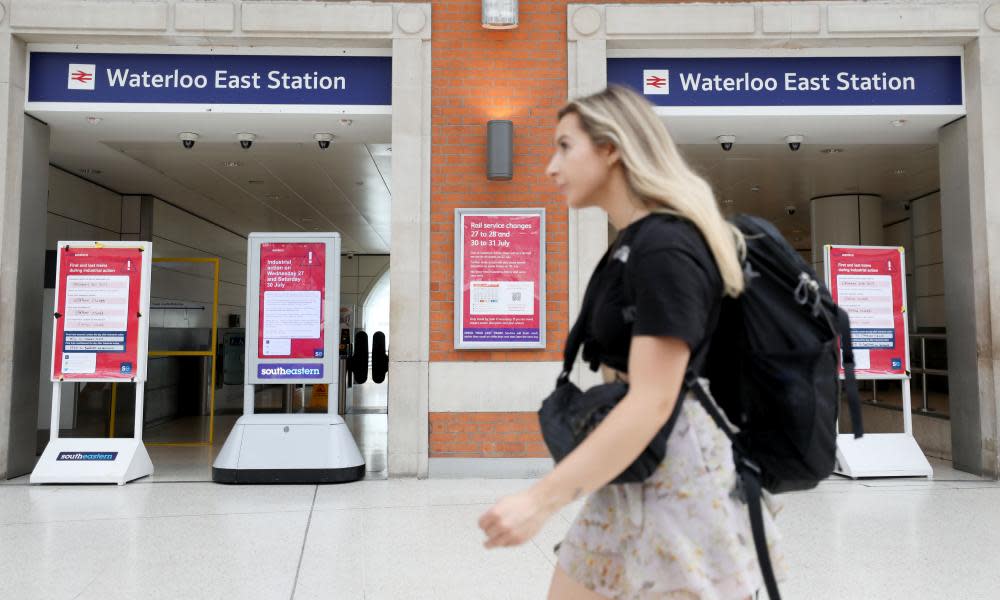Striking train drivers ‘here for the long haul’, says union on eve of strike

A 24-hour strike by train drivers across nine operating companies will leave large parts of Britain without services on Saturday, in the latest mass action over pay and working conditions on the railways.
The Aslef union warned that striking drivers were “here for the long haul”, on the eve of action that will stop most intercity trains on routes between London and the Midlands, northern England and Scotland, and affect trains in many other parts of Britain.
The drivers’ action is the first in a week of strikes by four separate transport unions that will severely disrupt rail services nationwide from next Thursday.
Related: Cost of living crisis: protests to launch across the UK
The rail industry warned passengers to avoid travel on affected routes on Saturday and to be prepared for very busy trains and possible last-minute changes or cancellations, with disruption expected to persist into early on Sunday.
The drivers going on strike are those who work for Arriva Rail London, Avanti West Coast, CrossCountry, Greater Anglia, Great Western, Hull Trains, LNER, West Midlands Trains and Southeastern.
No trains will run on London Overground, CrossCountry, Southeastern, West Midlands and London Northwestern Railway, or Avanti West Coast. Extremely limited services will run on Greater Anglia (including the Stansted Express), Great Western, Hull Trains and LNER.
Aslef’s leader, Mick Whelan, said further stoppages could follow Saturday’s, the union’s second day of coordinated strikes this summer, and with two further strike ballots pending, “we’ll have possibly more operators on strike next time”.
Steve Montgomery, the chair of the Rail Delivery Group, said earlier this week that an “open invitation for talks with Aslef stands”.
He added: “The railway is too important to this country to allow decline, but with passenger numbers still 20% below pre-pandemic levels, securing a bright future means we have to adapt to attract more people back.”
Whelan said he was open for further talks, but added: “I’ve never been in a situation before where the cartel of companies has agreed through the backdoor with the government they will limit our pay. We’re talking to people who don’t have latitude to deal with us.”
He said the government had started a “drip-feed about train drivers’ wages” before the dispute, but the salaries had been negotiated with companies over many years since privatisation.
“People say anyone can [drive trains] – no, anybody can’t do it. An awful lot of people fail the aptitude test and the driving test – and don’t like getting up at 3.10am for an 11-hour shift, or working 70-80% of weekends away from their families.”
However, he said: “The idea that we are going to be stigmatised and castigated isn’t working out.” With others such as barristers, police and nurses all threatening strikes, he said: “You have a nationwide political problem”.
Drivers were overwhelmingly behind the strike, Whelan said: “Like many people who stood up to be counted during the pandemic, they feel disaffected with a government who applauded them and now seem to want to rain pain upon them.
“We go tomorrow … People are very much up for it and understand we may be here for the long-haul. We don’t want to be, but there is a recognition that this may not be solved quickly.”
One of companies in dispute, Avanti West Coast, has already slashed schedules for a month due to few drivers volunteering for rest day working, which it has publicly described as “unofficial strike action” – aligning itself with the transport secretary, Grant Shapps, who Aslef had earlier denounced as “lying” about drivers choosing not to do overtime.
Whelan said: “When someone is stupid enough to lie about it they lose even further goodwill and it takes even longer to coax [staff] back.”
Labour said ministers should demand a plan urgently from Avanti to restore services. The shadow transport secretary, Louise Haigh, said: “If the private operator cannot fulfil their contract, they have no business holding it.”
The Department for Transport said Avanti’s move was “unavoidable”. A spokesperson said: “This is a prime example of why we need to modernise our railways, so that passengers benefit from reliable timetables which don’t rely on the goodwill of drivers volunteering to work overtime in the first place.”
Avanti declined to comment, but it is understood that the DfT has approved its reduced timetable, which has cut the number of trains between London, Birmingham and Manchester by two-thirds until September. Avanti will not face any penalty and will continue to receive fees as Shapps regards the move as a result of industrial action.
More widespread disruption is looming, with 40,000 members of the RMT union at Network Rail and 14 train operators staging two 24-hour strikes on 18 and 20 August, when several thousand TSSA members at Network Rail and seven train operators will also take action.
The lack of signallers will allow only about a fifth of the usual timetable to run.
Network Rail’s chief executive, Andrew Haines, said: “It saddens me that we are again having to ask passengers to stay away from the railway for two days next week due to unnecessary strike action, when we should be helping them enjoy their summers.
“We have made a good and fair offer but, with the exception of our TSSA management grades who accepted the deal, our unions are refusing to let our employees have a say.”
RMT members and some Unite members at Transport for London and London Overground will also go on strike on 19 August, stopping most tube services in the capital.

 Yahoo News
Yahoo News 
